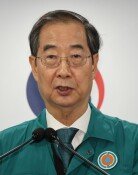Strong military should be the only aim of drastic military reshuffle
Strong military should be the only aim of drastic military reshuffle
Posted August. 09, 2017 07:14,
Updated August. 09, 2017 07:55
President Moon Jae-in conducted Tuesday a reshuffle of the military’s leadership including replacement of seven full general-level officers, including appointment of Air Force Chief of General Staff Chung Kyung-doo as Chairman of the Joint Chiefs of Staff. The fact that a general hailing from the Air Force has been named to the JCS Chairman, which was mostly filled with Army generals, is a surprise move. It is the first time in 69 years since the establishment of the Korean Armed Force in 1948 that former Navy and Air Force Chiefs of General Staff concurrently assumed the Defense Minister and the JCS Chairman, the top echelons of the military leadership.
With the latest reshuffle, five of the eight full generals have been filled with officers who are not alumni of the Korean Military Academy. Analysts say the reshuffle heralds looming defense reform including reduction of the Army’s manpower and generals, which President Moon Jae-in promised as his election pledge. A general who is a member of Class 39th of the KMA has been named to the Army Chief of General Staff, skipping the appointment of generals from members of Class 37th and 38th, which has ended the conventional practice, including promotion in line with order of ranks and KMA classes. Watchers say that generals who have built up strong trust and credibility in the military have been promoted.
Critics have said the South Korean Military has failed to overcome conventional structure of military forces centered on the Army, even though the military must cope with asymmetric strategy namely North Korea’s nuclear weapons and missiles. It is true that the South Korean military needed a major reshuffle of its organizational structure centered on the Army and the KMA. Insiders in the military have growing discontent that core positions of the military leadership have been dominated by people of certain connections. This is evidenced by the emergence of words such as "Aljahoi," a private club of KMA alumni, and "Doksapa," or a group of military officers who studied in Germany’s elite military school. Park Chan-joo, commanding general of the Army’s Second Operational Command who is suspected of abusing soldiers assigned to serve at his residence, is a figure known as a Doksapa member. In order for the South Korean military to transform from an administrative military focused on defense into a combat military centered on offence, the centerpiece of the Moon administration’s defense reform, the military must make innovation in military culture and ensure a fair personnel management system before anything.
The purpose of military reform is the establishment of a stronger military. Reform of the Army should not result in weakening of the combat capability of the Army, the centerpiece of the Armed Forces. With North Korea close to deploying nuclear weapons to combat mission, it is an unprecedented situation that generals hailing from the Navy and the Air Force are dominating the top military leadership, following suit of the presidential National Security Office that has been filled mostly with diplomats and professors. In personnel reshuffle of commanders and leaders above the level of commander of corps scheduled in September, it is necessary for the government to reinforce senior officials of the Joint Chiefs of Staff with combat experts specializing in military operations.
Chung, the nominee of the JCS Chairman who hails from the Air Force, should continue transforming the military into the one focused on high-tech weapons systems to prepare for future warfare. He must also introduce cutting-edge technology stemming from Fourth Industrial Revolution into the military by lowering the barriers between the Army, Navy and Air Force and utilizing civilian experts. He is also urged to reduce the unessential general positions, and thereby take the lead in strengthening field combat function. With the North’s threat of military provocations increasingly mounting at this point in time, the South Korean public can only afford to depend on the South Korean military to ensure safety.







